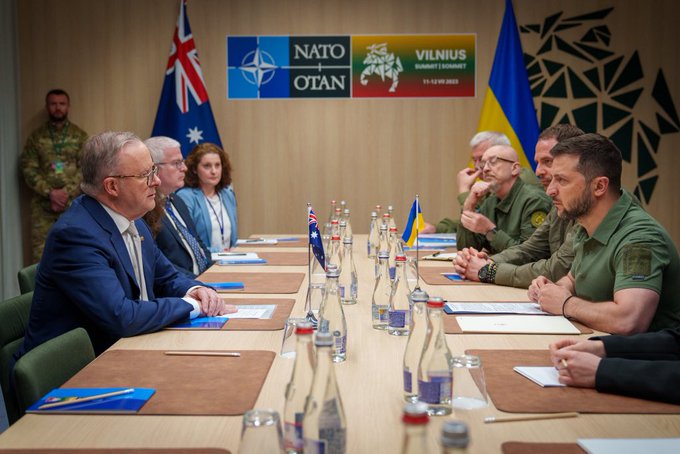And it’s over? Outcomes of the NATO summit in Vilnius
Posted By Jennifer Parker on July 14, 2023 @ 15:45

In the build-up to the 2023 NATO summit in Vilnius, Lithuania, the sense of history was palpable. The original NATO construct of 12 members, formed in 1949, is now 31 and will soon be 32 with Sweden’s accession. The alliance has endured plenty of instability in its lifetime, through the Cold War, the Suez crisis, the encircling of West Berlin and much more. Russia’s unrelenting 17-month war in Ukraine, a clear eye on China’s coercive behaviour and internal disagreements about the organisation’s role in the Indo-Pacific gave a sense of urgency and occasion to the summit, including for Australia.
The meeting was geared to tackle tough challenges, including Sweden’s and Ukraine’s bids for membership; security commitments to Ukraine, as a member or not; budgetary and preparedness challenges; future leadership, the Moscow–Beijing partnership; and Europe’s relationship with the Indo-Pacific.
There were initial doubts about whether Anthony Albanese would attend the summit and considerable speculation about what support Australia might provide Ukraine.
That conjecture was likely prolonged due to the government’s wish to save ‘announceables’ for the prime minister’s European trip—while the additions to Australia’s support may have been a consequence of public criticism of the assistance package announced last week [1].
Most of the uncertainties heading into the summit, including Australia’s ongoing support for Ukraine, were resolved. So how did it all end? Well, Sweden is in and Jens Stoltenberg has been extended as the organisation’s secretary-general, consistent with a view that NATO is only getting started with its support for Ukraine, not showing the fatigue about which so many had been concerned. Predictably, though, Ukrainian President Volodymyr Zelensky is disappointed.
The NATO summit communiqué reaffirmed the Bucharest decision to admit Ukraine as a member, but it declined to outline a clear pathway to membership. That drove the Ukrainian leader to describe the decision as ‘unprecedented and absurd’.
The summit communiqué stated [2]: ‘We will be in a position to extend an invitation to Ukraine to join the Alliance when Allies agree and conditions are met.’ The precise nature of those conditions is not yet clear, but the writing was on the wall before the summit when key allies such as Germany and the US expressed reservations.
In some respects, it was a missed opportunity. Mapping out a pathway for Ukrainian membership should be part of a deterrence strategy to prevent Russia from thinking it will succeed merely by prolonging the war.
While Ukraine is understandably disappointed, Zelensky was happier with the assistance packages, including the gifts pledged by Albanese.
Recent Australian support has been provided in three tranches. In late June came the announcement of $110 million worth of military vehicles, ammunition and humanitarian assistance. On the eve of the Vilnius summit, the government revealed that a Royal Australian Air Force E7 Wedgetail airborne early warning and control aircraft would be deployed to Germany to help watch over the supply lines for lethal and humanitarian aid heading to Ukraine. That highly sophisticated aircraft is likely to be capable of much more.
The third in the trio of announcements came on the last day of the summit, when Albanese met with Zelensky and promised a further 30 Bushmaster armoured personnel carriers to help protect Ukrainian troops advancing across a mine- and bomb-strewn landscape.
While the package appears piecemeal and aimed at driving announcements, heart should be taken from the broader Australian public’s resolve for Ukraine and the government’s willingness to listen and increase its support.
But with no end to the conflict in sight, the Australian government now has the opportunity to evolve the current stop–start approach and consider what a continued meaningful contribution to Ukraine looks like. That won’t be easy, with the Department of Defence under significant financial pressure and the government insisting on the costs of supporting Ukraine being absorbed within Defence’s existing budget. But it’s a better approach than the current one of inadequate assistance, followed by public criticism and then more government support. Let’s skip the first two parts.
The one area of inconsistency centred on NATO’s relationship with the Indo-Pacific. Australia’s invitation to the summit as part of the Indo-Pacific four—with Japan, the Republic of Korea and New Zealand—was significant. And, importantly, the NATO communiqué contained strong words on Beijing’s coercive policies and subversion of the international rules-based order. In a sign of the ongoing global shift within NATO, the EU and many member states, Indo-Pacific security warranted a mention: ‘The Indo-Pacific is important for NATO, given that developments in that region can directly affect Euro-Atlantic security.’ This is a direct response to Beijing’s military build-up and economic coercion.
Yet the communiqué contained no mention of the plan, now in doubt, to open a NATO office in Japan. That outcome is likely to have followed French President Emmanuel Macron’s objection, which unfortunately seems to be based on attempts to mollify China and not on precedent, given the existence of offices in other regions such as Africa.
Regrettably, this shows tensions within the organisation on how to engage on Indo-Pacific security. That’s even more disappointing given that the main holdout, France, is a Pacific power. In the face of this tension, it’s vital that Australia not be silent and continue to be a proactive advocate of the inseparability of Euro-Atlantic and Indo-Pacific security. The national interest demands a year-round strategy, not just annual visits.
Article printed from The Strategist: https://www.aspistrategist.org.au
URL to article: https://www.aspistrategist.org.au/and-its-over-outcomes-of-the-nato-summit-in-vilnius/
URLs in this post:
[1] assistance package announced last week: https://www.aspistrategist.org.au/ukraines-survival-is-crucial-for-everyones-security/
[2] stated: https://www.nato.int/cps/en/natohq/official_texts_217320.htm
Click here to print.